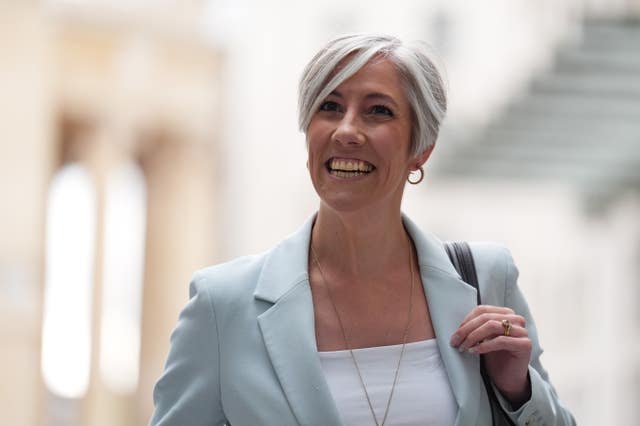Chancellor sidesteps calls to reverse cuts to winter fuel allowance and benefits
Ministers are reportedly considering making changes in a bid to placate Labour rebels.

Rachel Reeves has sidestepped calls to help those in fuel and food poverty by reversing winter fuel allowance cuts and the two-child benefit cap.
The Chancellor said she would “never” make a policy commitment without being able to say where the money is coming from after claiming the Government has “returned stability back” to the UK economy.
Ms Reeves also said the Government had to take “difficult decisions and urgent decisions” following last summer’s election as she responded to MPs urging her to change course.
Reports have suggested ministers could remove the two-child benefit cap or reconsider its decision to means-test the winter fuel payment for pensioners, as a means of placating rebellious Labour MPs.
Ms Reeves told LBC that she is “listening” to the concerns “about the level at which the winter fuel payment is removed”, which hinted at possible changes to the threshold.
Speaking at Treasury questions, Independent MP Rosie Duffield (Canterbury) told the Commons: “Westminster is once again buzzing with the latest U-turn speculation and briefings over the Chancellor’s policies on the winter fuel allowance and the two-child limit benefits cap.
“It’s less of a buzz for those visitors to Canterbury Food Bank, however, who last month distributed enough food to make 13,545 meals – a 47% rise on the same period last year.
“Will the Chancellor end the serious anxiety of those experiencing fuel and food poverty now and reverse those policies?”
Ms Reeves replied to her former Labour colleague: “The only reason that we’ve been able to grow the economy and get those cuts in interest rates, which helped working families in Canterbury and right across our country, is to have returned stability back to our economy and that means never making a policy commitment without being able to say where the money is coming from; that is what got our country into a mess under the previous government.
“So we’ve set out the policies that we needed to put investment into the NHS and to secure our public finances.”

Liberal Democrat Treasury spokeswoman Daisy Cooper said: “Yesterday the Chancellor said that she understands the concerns that some people have about the limit at which the winter fuel payment is removed.
“In light of that, does the Chancellor now agree that restricting the eligibility so tightly was a mistake?”
Ms Reeves replied: “When I became Chancellor last year we inherited a £22 billion black hole in the public finances not at some year in the future but in the financial year that we were already three or four months into.
“It meant that we had to make difficult decisions and urgent decisions to put our public finances back on a firm footing because unlike the party opposite we will never play fast and loose with the public finances.”
Labour MP Brian Leishman (Alloa and Grangemouth) called for a wealth tax.
He said: “To alleviate grinding penury for millions the Chancellor could introduce an annual wealth tax on multimillionaires that would raise approximately £24 billion per annum – yet the Chancellor refuses to entertain this, but does consider cuts to welfare as acceptable.
“Why do ‘tough political choices’ always seem to impact those who are most vulnerable?”
Ms Reeves replied: “At the budget last year we increased the rate of tax on non-doms, we increased capital gains tax, we increased the carried interest on bonuses and we also introduced VAT on private schools.
“This Government is ensuring that wealthiest pay their fair share because that’s a basic Labour principle.”
Shadow chancellor Mel Stride pressed Ms Reeves on her future tax proposals, asking: “Can the Chancellor explain what the economic secretary (Emma Reynolds) meant last week when she said that there will be ‘no tax rises on individuals at the autumn budget’, and can she similarly confirm that there will be no tax increases on businesses?”
Ms Reeves replied: “In our manifesto we set out that we would not increase taxes on working people – the income tax, national insurance or VAT that they pay – and it’s why we also reversed the decision by the previous government to increase fuel duty, which would have had a disastrous effect on working people in our country.
“We will set out all other tax policy at the budget.”
Elsewhere in the session, Ms Reeves said the Government believes the UK’s new trade deal with the EU will bring down bills for consumers.
Labour MP Graham Stringer (Blackley and Middleton South) said: “The European emissions trading scheme has a carbon price 50% higher than the UK’s price.
“What assessment has the Chancellor made of the impact of joining this scheme will have on inflation in this country?”
Ms Reeves replied: “Sometimes the UK carbon price has been higher, sometimes it’s been lower than the carbon price in the EU. But what this deal will ensure is a bigger market which on average brings prices down.
“We’re confident that the deal secured yesterday will bring more good jobs and will bring down bills for consumers.”





